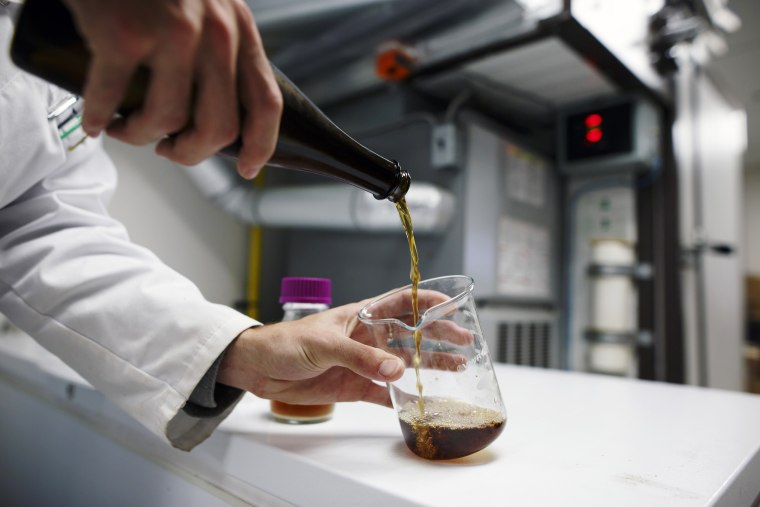Beer has been a staple of American culture for as long as baseball and apple pie. But it seems America’s tastes for a good old-fashioned cold one is shifting to other alternatives, like cannabis, as tastes and lifestyles change — and beer makers are taking notice.
Beer sales have been on the decline in recent years, recording a 1 percent drop by volume in 2017 and 2018, according to the Brewers Association, a trade group for small and independent brewers. While 1 percent may not seem like much, domestic beer sales have continued to trend downward, with consumers opting for pricey wines or craft beer — or skipping alcohol altogether, according to data from IWSR, which analyzes data for the beverage industry.
There is also evidence that consumers are shifting consumption to cannabis instead of alcohol, particularly in states where it’s legal.
One study showed that in counties in states where cannabis is legal for medical use, monthly alcohol sales dropped 13 percent.
"We're seeing a drop in alcohol consumption or a difference in the way people drink," said Luis M. Alcalde, an Ohio-based cannabis lawyer. "If people are doing cannabis, they aren't drinking a lot of alcohol."
Capitalizing on this trend, beer makers are pouring money into cannabis companies, both in an effort to diversify product lines and to catch the explosive growth occurring in the cannabis industry.
Molson Coors, which entered into a joint venture with Canadian cannabis company Hexo to produce CBD-infused beverages, expressed concern over the impact of legal cannabis on its products, noting in an annual investment filing that it “may result in a shift of discretionary income away from our products or a change in consumer preferences away from beer.” The joint venture plans to launch a portfolio of cannabis-infused beverages this fall in Canada, where cannabis is legal for both recreational and medicinal purposes.
Constellation Brands, the $34 billion company behind Corona and Modelo beers, invested $4 billion into the Canadian cannabis company Canopy Growth last year to produce cannabis-infused beverages in Canada.
“I believe there is not a segment of consumer-package goods, veterinarian care, pharmaceutical research — there’s not one significant company in any of those segments that does not have a committee looking at it saying 'How can we enter?'" said Canopy Growth CEO Bruce Linton.
A new report projects the cannabis market in the United States will reach $22.7 billion in sales by 2023. As for the cannabis-infused beverage market, it could become a $600 million market in the U.S. by 2022, according to analysts at Canaccord Genuity.
While there’s no question that the race is on to introduce cannabis-infused beverages, the bigger question is: What kind of beverages will consumers gravitate to?
Cannabiniers is betting on beer. The San-Diego-based cannabis company, which has actively been acquiring small craft brewers, believes introducing cannabis in an already social beverage like beer is the direction to go.
“My focus is mostly on the beer, because that’s going to be the biggest game changer,” said Kevin Love, vice president of market activations for Cannabiniers. “That’s the biggest paradigm shift — because you don’t get with your friends and chug a bunch of sparkling water or coffee.”
Beer companies aren’t the only ones who want a hit. Coca-Cola is closely eyeing the cannabis market, tobacco giant Altria has made a sizable investment in cannabis company Cronos Group, and Mondelez, maker of Oreo cookies, said it is considering adding CBD-infused snacks to its product line.
With so many companies throwing billions of dollars at the cannabis market, and states seeing the potential for significant tax revenue, the legalization of cannabis in the U.S. is expected to expand. Currently, 10 states and Washington, D.C., have legalized marijuana for recreational use, and 33 states have legalized medical marijuana.
Louis J. Terminello, chair of the hospitality, alcohol and leisure industry group at the Greenspoon Marder law firm, believes that a combination of big dollar investment, the potential for significant tax revenue and shifting public opinion is adding to the legitimacy of the cannabis business, which will likely lead to increased legalization.
“Like alcoholic beverages, the potential for federal tax revenue is huge," Terminello said. "This notion is beginning to sink in with policymakers, and as such legalization will surely follow.”
Until cannabis is legalized at the federal level in the U.S., major U.S. companies will be closely eyeing their northern neighbors to see what’s flying high and what’s falling flat.
